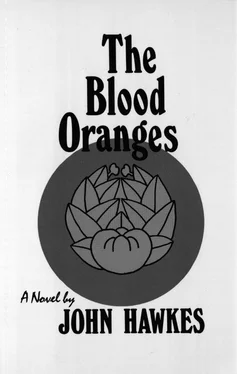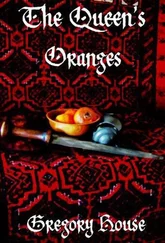John Hawkes
The Blood Oranges
Is there then any terrestrial paradise where, amidst the whispering of the olive-leaves, people can be with whom they like and have what they like and take their ease in shadows and coolness?
— Ford Madox Ford; THE GOOD SOLDIER
LOVE WEAVES ITS OWN TAPESTRY, SPINS ITS OWN GOLDEN thread, with its own sweet breath breathes into being its mysteries — bucolic, lusty, gentle as the eyes of daisies or thick with pain. And out of its own music creates the flesh of our lives. If the birds sing, the nudes are not far off. Even the dialogue of the frogs is rapturous.
As for me, since late boyhood and early manhood, and throughout the more than eighteen years of my nearly perfect marriage, I always allowed myself to assume whatever shape was destined to be my own in the silken weave of Love’s pink panorama. I always went where the thread wound. No awkward hesitation, no prideful ravaging. At an early age I came to know that the gods fashion us to spread the legs of woman, or throw us together for no reason except that we complete the picture, so to speak, and join loin to loin often and easily, humbly, deliberately. Throughout my life I have never denied a woman young or old. Throughout my life I have simply appeared at Love’s will. See me as small white porcelain bull lost in the lower left-hand corner of that vast tapestry, see me as great white creature horned and mounted on a trim little golden sheep in the very center of Love’s most explosive field. See me as bull, or ram, as man, husband, lover, a tall and heavy stranger in white shorts on a violet tennis court. I was there always. I completed the picture. I took my wife, took her friends, took the wives of my friends and a fair roster of other girls and women, from young to old and old to young, whenever the light was right or the music sounded.
Now there is only my little South European maid. She speaks an ugly language that will never be mine, she cannot understand a word of my lengthy erotic declarations. She does not smile, she has never known my sexual embrace, may never have known the sexual embrace of any man, this small solemn girl who appears to have been created only to draw water and build fires. But together we live in our otherwise abandoned villa which is one of a pair, long and single-storied, with broken red tiles and fireplaces like abandoned urinals, live together in our drafty and sometimes muddy villa where I knew my last mistress, sang my last song, last spread the legs of my wife. I have named my maid Rosella because the calves of her legs are raw, unshaven, and because she wears thick gray woolen socks. She cooks, she draws water, I spend my time attempting to inflame Rosella with words she does not understand, attempting to surround the ignorant virginity of Rosella’s spirit with at least the spoken tones of joy and desire. I have made myself rules: no touching, nothing overt. Only the spoken tones of joy and desire.
Why, after more than eighteen years, does the soft medieval fabric of my tapestry now hang in shreds — here the head of a rose, there the amputated hoof of some infant goat? Is it possible that in purging her field of Hugh’s sick innocence Love (impatient Love) purged me as well? Eliminated even her own faithful sex-singer from the joyous field? It is possible. The villa that is twin to mine and that lies just on the other side of the funeral cypresses is empty.
But I am patient, I am faithful, perhaps one day I will reach out and close my fingers on Rosella’s thigh, perhaps my last mistress may again become my mistress. It is possible. We shall wait and see.
YESTERDAY I PAID MY WEEKLY VISIT TO MY LAST MISTRESS. She has been given refuge in the sanctuary, that small white cluster of Moorish-looking buildings above the town. Each week I visit her. My ritual, my weekly ritual of hope and fidelity, and in the process I suppose I reveal vestiges of the former lover, the former man of good taste.
Yes, in these visits and in my personal habits which involve crude but elaborate baths, the selection of a shirt and faded tie for the day, the trimming of thick waves of hair around the ears, the care of fingernails as well as exercises for the body, and even an effort to pay some attention to shoes (to brush or knock the dried mud from them if not to polish them), yes, in visits and habits I tell myself and my indifferent and backward world that this abandoned man survives the period of his uselessness, that no catastrophe can destroy true elegance. Each night I wear my nearly ruined black dinner clothes, Even though I expect never again to travel, still I keep in the stone loft above my bed those old cowhide suitcases now covered with mold. Weekly visits, personal habits, a very nearly aesthetic memory— to me it is worth something to know that if circumstances ever gave me back my last mistress or my wife Fiona, I would be as attractive to both these women as I was in the days when, to both of them, I was the white bull brightly fired in Love’s kiln. To me fidelity is the most masculine trait of all.
Yesterday the small white cluster of Moorish-looking buildings above the town looked exactly as it had the week before, and as usual the little fat women in their white dresses, blue aprons and worn-down sandals were expecting me. Even while I was chaining the bicycle to the stunted tree (the bicycle is old, rusted, with large wheels and rotted tires and a pair of narrow handlebars without grips, a pathetic machine yet still functioning, so that if left unchained it would be stolen by the first man, woman or child who happened to see it leaning unguarded against the tree) and even while I was reaching for the thong that hangs from the clapper in the bell that is like a baby’s head cast in iron, even in the midst of these preliminaries, one of the little fat women was already staring at me over the low wall.
I smiled, nodded, threw away the small wet butt of my precious cigarette, and through a series of gestures (lifting of eyebrows, baring of teeth, a rolling motion of the hand) tried both to ask if I was to be admitted safely this morning and to make it clear that I knew perfectly well that I was.
Each week it is the same. My slow bike ride takes me from the villa where I live by choice with Rosella, through the poor coastal village with its ruined aqueduct and small houses of charred bone (that wet dark place always fetid with the faint bulbous aroma of sewer gas still rising from the deep pits dug by ancient barbarians), then out of the darkness and up the crusted slope of the hill and on to these white Moorish buildings and clean fat women and stubby men lolling in their constricting uniforms. The same each week, from dead snails and sediment and the stately gloom of the funeral cypresses to the sudden light, peace, charm of this walled sanctuary. The yellow fountain, the orange sand of the courtyard, the white walls and deep-set windows, the tobacco-colored trees with their enormous leaves in the shape of fat supplicating hands, the low balconies, and above everything the pale blue tile roofs that suggest a bright powdery fusion of sky, sea, child’s eye, a soft lively blue unlike any other blue I have ever seen. Each week I find all this waiting at the end of the bike ride, and enjoy it, delight in it, my sophistication only enriching if anything the aching candor of the blue tiles. The sanctuary is simple and mysterious too, is antithetical to the brambles and broken tiles of the primitive landscape above which it is set. Surely the sanctuary was conceived and built by someone who could never vocalize the harsh unimaginative language of this terrain.
Aching candor. Though I am a dispassionate man, the phrase is equally appropriate to me and to the blue tiles roofing the sanctuary. Aching candor describes exactly what I felt yesterday, and feel each week, when we crossed the remaining portion of the orange courtyard, passed into the shade of the trees, at last turned to the right and approached the nearest balcony where my last mistress sat wrapped in a large thick woolen blanket. I smiled, stood close beside her low balcony wall, stared at her apparently sleeping face until my own head, eyes, mouth, chest, felt saturated with aching candor. Once my mistress, now Hugh’s widow, perhaps some kind of essential invalid, though I think not, there sat Catherine merely feigning sleep, I knew, and in her silence still basking, blazing, bristling, collapsing in the invisible aftermath of our long adventure.
Читать дальше












